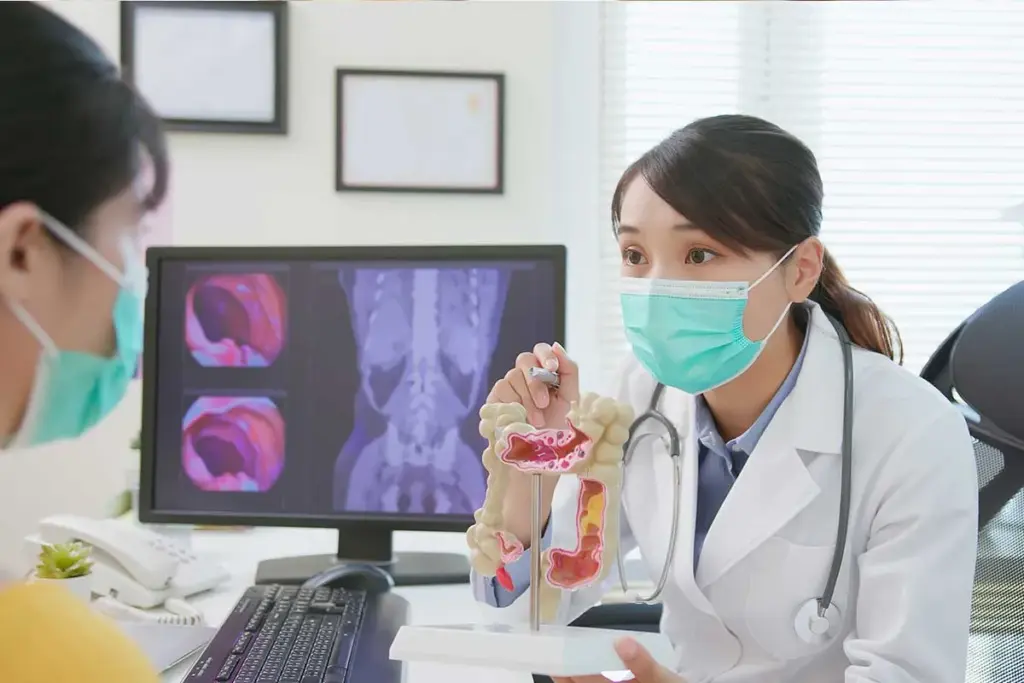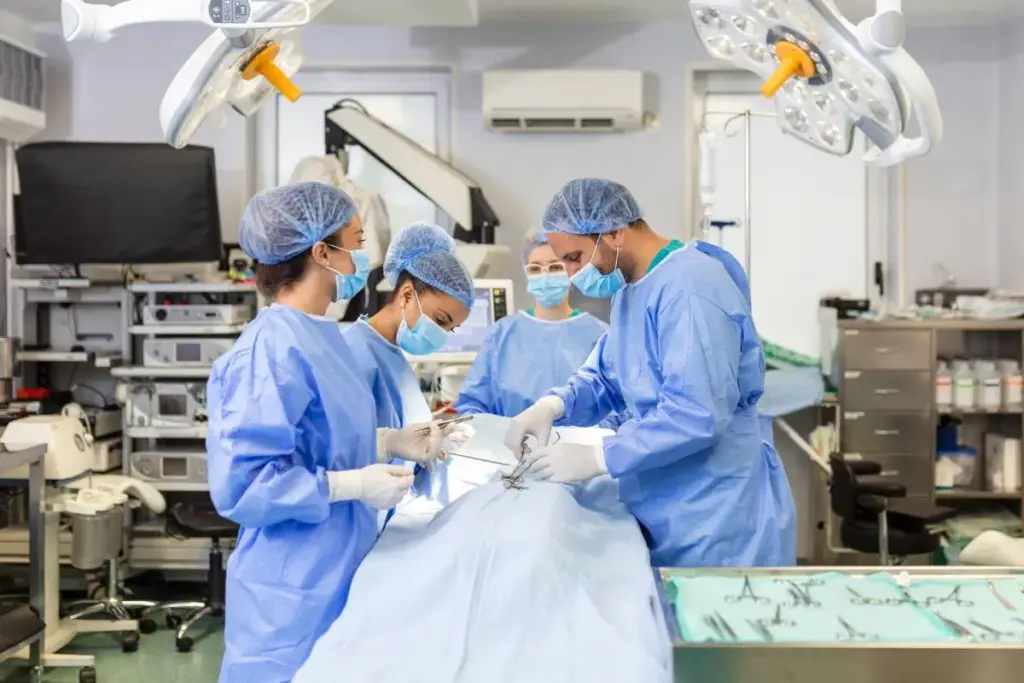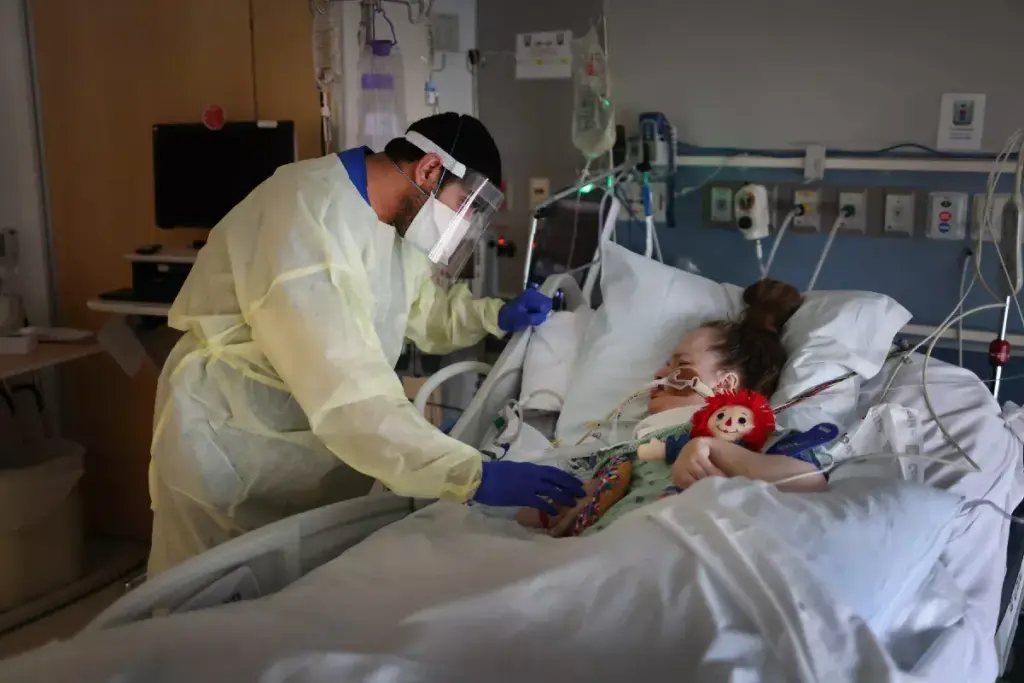Is Coffee Bad for My Colon? Constipation is a common problem that affects millions of people worldwide. It causes discomfort and disrupts daily life. For those who suffer from it, the relationship between their daily habits and bowel movements is key. Many wonder if coffee consumption impacts colon health.
Research shows that coffee can have both good and bad effects on the digestive system. Some people find that coffee helps with bowel movements. But others may experience negative effects. As a leading provider of advanced medical treatments, we explore the connection between coffee consumption and colon health to provide clarity on this matter.
Key Takeaways
- Coffee consumption can stimulate bowel movements in some individuals.
- The impact of coffee on colon health varies from person to person.
- Understanding the relationship between coffee and digestive health is key for managing bowel movements.
- Coffee may have both positive and negative effects on the colon.
- Moderation is key when consuming coffee to minimize negative effects.

Understanding the Relationship Between Coffee and Digestive Health
Coffee and digestive health have a complex relationship. Coffee is a favorite drink worldwide, and its effects on digestion are of great interest. We’ll look into how coffee affects digestion and clear up myths about its impact on colon health.
How Coffee Interacts with Your Digestive System
Coffee boosts digestion by making more stomach acid and releasing hormones like gastrin and cholecystokinin. These hormones help control bowel movements and digestion. The gastrocolic reflex from coffee helps move your bowels.
Coffee’s effects on digestion are detailed. It has compounds that can change how your gut moves and secretes. For example, caffeine makes your gut muscles work harder.
Common Misconceptions About Coffee and Colon Health
Many believe coffee causes dehydration and constipation. But, drinking coffee in moderation doesn’t usually lead to dehydration. Another myth is that coffee causes colon cancer. While coffee might protect against some diseases, its link to colon cancer is not fully understood.
How coffee affects you can differ a lot. The type of coffee, how it’s made, and your caffeine sensitivity all play a part. These factors can change how coffee impacts your digestion.
The Composition of Coffee: What Actually Affects Your Colon
It’s important to know what’s in coffee to understand its impact on our colon. Coffee isn’t just a simple drink. It’s a mix of many compounds, some of which can affect our digestive system.
Active Compounds in Coffee
Coffee is full of bioactive substances like antioxidants, polyphenols, and diterpenes. These can affect our colon health in different ways. For example, antioxidants in coffee might protect our colon by fighting oxidative stress and inflammation.
The role of polyphenols in coffee is key. They have anti-inflammatory properties and may help protect our colon. Studies show that coffee polyphenols could lower the risk of colon cancer by affecting how cells grow.
Diterpenes and Other Bioactive Components
Diterpenes, like cafestol and kahweol, are found in coffee and have been studied for their health effects. They are more common in unfiltered coffee. Research shows they can have both good and bad effects on health, depending on how much we drink.
| Compound | Potential Effects on Colon Health | Presence in Coffee |
| Antioxidants | Protective against oxidative stress and inflammation | Present in all types of coffee |
| Polyphenols | Anti-inflammatory, possible cancer prevention | Found in brewed coffee |
| Diterpenes (Cafestol, Kahweol) | Potential health effects, both positive and negative | Higher in unfiltered coffee |
By knowing what’s in coffee and how it affects our colon, we can see the complex link between coffee and our digestive health.
Coffee and Colon Health: The Scientific Perspective
Research keeps evolving, and we’re learning more about coffee and colon health. It seems coffee might have both good and bad effects on the colon.
Current Research Findings
Recent studies have looked into coffee’s link to colon health. They’ve found some interesting results. For example, a study in the Journal of the National Cancer Institute found that coffee might lower colon cancer risk.
The good effects of coffee on the colon could be due to:
- Antioxidant properties: Coffee has lots of antioxidants. These can protect the colon from damage.
- Anti-inflammatory effects: Caffeine and other coffee compounds might reduce colon inflammation. This could lower cancer risk.
- Improved gut motility: Coffee can help move bowel movements. This might prevent constipation and lower cancer risk.
Limitations in Coffee-Related Studies
Even with promising findings, there are study limitations. Many studies rely on people telling how much coffee they drink. This can be biased. Also, what’s considered “moderate” coffee varies by study.
Some key issues include:
- Lack of standardization: Studies use different ways to measure coffee intake. This makes it hard to compare results.
- Confounding variables: Other lifestyle factors, like diet and exercise, can affect coffee’s impact on colon health.
- Need for more diverse populations: Most studies focus on certain groups, like Europeans or Americans. We need more diverse research.
Understanding both the findings and limitations helps us grasp the complex coffee-colon health relationship. As more research comes out, we’ll learn more about coffee’s effects on the colon.
How Coffee Stimulates Bowel Movements
Coffee can help move your bowels, but how it does this isn’t fully known. We’ll look at how coffee affects your digestive system. This includes the gastrocolic reflex and how it works.
The Gastrocolic Reflex
The gastrocolic reflex happens when food or drink goes into your stomach. It makes your gut move. Coffee is a strong trigger for this reflex, making you feel like you need to go.
Drinking coffee, empty stomach or not, starts this reflex. The acidity and caffeine in coffee help get things moving.
Timing and Intensity of Coffee’s Effects
How coffee affects your bowels can differ from person to person. The amount you drink, how it’s made, and your caffeine sensitivity matter. These factors affect how fast and strong coffee’s effects are.
Caffeine is a big part of this, as it makes the colon muscles contract. This helps move stool faster. But, coffee’s laxative effect isn’t just from caffeine. Other compounds in coffee also play a role.
Knowing how coffee affects your bowels can help with digestive health. For those who find coffee helps with constipation, a little coffee might be good. It can be part of a plan to keep your digestive system healthy.
Coffee’s Impact on Gut Microbiome
The effect of coffee on our gut microbiome is a topic of much interest. It shows how coffee can change our digestive system. The gut microbiome is a key area to study in this process.
Coffee can change our gut microbiome in different ways. These changes can be good or bad. Knowing how coffee affects our digestive health is important.
Beneficial Changes to Intestinal Flora
Coffee can help our gut flora in good ways. Studies show that drinking coffee in moderation can increase good bacteria. This can improve our digestion and boost our immune system.
Coffee also has prebiotic properties. This means it helps good bacteria grow. Eating foods like kefir and yogurt can make this effect even stronger.
Potential Negative Effects on Gut Bacteria
But coffee can also have negative effects on our gut. Drinking too much coffee or being sensitive to it can harm our gut bacteria. Some people might see an imbalance in their gut flora.
Coffee’s acidity and how it moves food through our gut can also affect our microbiome. This might cause discomfort or worsen digestive problems for some. It’s important to know these risks and drink coffee wisely.
In summary, coffee’s effect on our gut microbiome is complex. It depends on how much coffee we drink and how our bodies react. By understanding these factors, we can enjoy coffee while keeping our digestive system healthy.
Coffee and Colon Cancer Risk: What the Research Shows
Coffee’s effect on colon cancer risk is getting more attention. Studies suggest it might help protect against colon cancer. We need to look at coffee’s bioactive compounds and what studies say.
Protective Properties in Coffee
Coffee has many bioactive compounds, like polyphenols, which fight cancer. Polyphenols protect cells, reduce inflammation, and might stop cancer cells from growing. These compounds are key to coffee’s possible benefits against colon cancer.
Some important polyphenols in coffee are:
- Chlorogenic acid
- Quinic acid
- Caffeic acid
These might help coffee protect against colon cancer by changing gut bacteria and affecting metabolism.
Population Studies and Statistical Evidence
Many studies have looked at coffee and colon cancer risk. A big review found that moderate coffee drinkers might have a lower colon cancer risk. This is compared to those who don’t drink coffee or drink too much.
Recent studies have shown:
- A big study found a clear link between coffee and lower colon cancer risk.
- Other studies found that drinking more coffee is linked to less colon cancer risk.
Even though these results are encouraging, we can’t say for sure that coffee causes these benefits. More research is needed to understand how coffee might protect against colon cancer.
As we keep studying coffee and colon health, it’s clear that coffee’s effects on the gut, inflammation, and cancer cell growth are important to explore further.
Coffee Consumption and Inflammatory Bowel Conditions
Coffee is a popular drink that has been studied for its health effects. It’s been looked at for its impact on inflammatory bowel disease (IBD). IBD includes diseases like ulcerative colitis and Crohn’s disease, which cause long-term inflammation in the gut.
Research on coffee and IBD has given mixed results. Some studies say coffee might help with IBD in some ways. But others warn it could have negative effects.
Effects on Ulcerative Colitis
Ulcerative colitis is a type of IBD that affects the colon. Studies on coffee and ulcerative colitis have shown different outcomes. Some say moderate coffee drinking might not make symptoms worse and could even help.
A study in a gastroenterology journal found coffee might lower the risk of ulcerative colitis coming back. But, it’s important to remember that people react differently to coffee.
Coffee and Crohn’s Disease Management
Crohn’s disease is another IBD type that can hit any part of the gut. The effect of coffee on Crohn’s disease symptoms is not as well understood as it is for ulcerative colitis.
Some people with Crohn’s say coffee makes their diarrhea and stomach pain worse. But, other studies suggest moderate coffee drinking might not harm them too much.
| Coffee Consumption Level | Effect on Ulcerative Colitis | Effect on Crohn’s Disease |
| Moderate (2-3 cups/day) | Potential reduction in relapse risk | Mixed results; may trigger symptoms in some |
| High (more than 4 cups/day) | Insufficient data; may increase symptoms | Potential increase in symptoms like diarrhea |
For those with IBD, managing symptoms and staying in remission is key. Coffee might be part of their diet, but knowing its effects is important for making smart choices.
Coffee and Irritable Bowel Syndrome (IBS)
People with Irritable Bowel Syndrome (IBS) often ask if coffee makes their symptoms better or worse. The link between coffee and IBS is complex. It depends on many factors that can either make symptoms worse or better.
Triggering vs. Relieving IBS Symptoms
Coffee’s effect on IBS symptoms can differ a lot from one person to another. Some might feel their diarrhea or stomach pain get worse after drinking coffee. Others might not see any big changes or might even feel better if they have constipation.
The gastrocolic reflex, which coffee triggers, can also play a part. This reflex makes the digestive system move more. For some, this is good, but for others, it can be a problem.
Personalized Approaches for IBS Sufferers
Because coffee affects IBS symptoms differently for everyone, a tailored approach is key. Keeping a food and symptom diary can help track how coffee impacts IBS.
Adjusting coffee habits based on personal reactions can help manage IBS symptoms. This might mean drinking less coffee, switching to decaf, or changing how it’s brewed.
| Coffee Consumption Adjustment | Potential Benefit for IBS Sufferers |
| Reducing coffee intake | May decrease frequency of IBS symptoms |
| Switching to decaf | Could reduce caffeine-related symptom triggers |
| Changing brewing methods | Might alter coffee’s chemical composition, potentially easing IBS symptoms |
By understanding how coffee affects their IBS symptoms and making smart changes, people can manage their condition better. This way, they can enjoy coffee without it making their symptoms worse.
The Acidity Factor: How Coffee’s pH Affects Your Colon
Coffee’s acidity can really affect our digestive system, focusing on the colon. It’s key to know how different coffee types affect our health.
Comparing Acidity Levels in Different Coffee Preparations
Many things can change coffee’s acidity, like the beans, roast, and brewing method. Lighter roasts are usually more acidic than darker ones. Arabica beans are more acidic than Robusta.
The brewing method also changes acidity levels. Pour-over and cold brew have different levels than drip or French press.
Cold brew coffee is less acidic than hot-brewed because of its lower temperature. This is good for those who get upset stomachs from acidic drinks.
Acid-Reducing Coffee Options
If you’re worried about coffee’s acidity, there are ways to make it less acidic. You can pick coffee beans that are naturally less acidic. Some brands even make coffee that’s been made less acidic.
Changing how you brew your coffee can also help. Using a coarser grind or brewing with hotter water and for longer can make it less acidic. Adding a bit of milk or creamer can also help balance out the acidity.
Some natural compounds, like Berberine HCl, can also help with digestion. They’re not directly related to coffee’s acidity but can help with digestive health.
Being careful about the coffee we drink and how it’s made can help. We can choose less acidic beans or try different brewing methods. This way, we can enjoy coffee without harming our colon.
Coffee Additives and Their Effects on Colon Health
It’s important to know how coffee additives affect our colon health. Coffee itself has good and bad effects on our colon. But, the additives we add can change how coffee impacts our health.
Sugar and Artificial Sweeteners
Many of us add sugar or artificial sweeteners to our coffee. But, this can harm our colon health. Too much sugar can increase the risk of colon cancer and other digestive problems. Artificial sweeteners, even though they don’t have calories, can also upset our gut bacteria.
Research shows that sweeteners like aspartame and sucralose can change our gut bacteria. But, we don’t know all the long-term effects yet. It’s key to watch how much sugar or artificial sweeteners we add to our coffee.
Key Considerations:
- Reducing added sugars can lower the risk of colon cancer.
- Being careful with artificial sweeteners can help keep our gut healthy.
Dairy and Non-Dairy Creamers
Dairy and non-dairy creamers can impact our colon health differently. Dairy creamers have lactose, which can cause problems for those with lactose intolerance. This can lead to bloating and discomfort.
Non-dairy creamers, made from nuts, soy, or coconut, may have additives like thickeners and emulsifiers. These can also affect our gut health. So, it’s important to pick creamers carefully.
| Creamer Type | Potential Effects on Colon Health |
| Dairy | Lactose intolerance issues |
| Non-Dairy | Potential impact from additives like thickeners |
Flavoring Agents and Preservatives
Flavoring agents and preservatives in coffee additives can also impact our colon health. Some flavorings may contain artificial ingredients that can be hard on our digestive system.
“The gut is a complex ecosystem, and what we put into our bodies can significantly affect its balance and overall health.” – Dr. [Last Name], Gastroenterologist
When picking flavored coffee or additives, choose natural flavorings. Be aware of the ingredients used.
Actionable Tips:
- Read labels carefully to avoid unwanted additives.
- Choose natural flavorings when possible.
- Be mindful of the overall diet to maintain a healthy balance.
Brewing Methods and Their Impact on Digestive Health
Coffee brewing techniques can change the chemical makeup of the drink, affecting our gut health. It’s key to know how different methods impact our digestive system.
Cold Brew vs. Hot Brew Differences
The brewing temperature greatly changes coffee’s chemical makeup. Cold brew coffee, made by steeping coarse-ground beans in cold water, has less acidity than hot brew. This might be good for those with sensitive stomachs or heartburn.
Hot brew coffee, made with hotter water, pulls out more acidic compounds and diterpenes. These might not be great for everyone’s digestive health. Yet, the heat also brings out compounds that could help our metabolism.
Filtered vs. Unfiltered Coffee
Using a filter in brewing coffee also affects its health impact. Filtered coffee, which goes through a paper or metal filter, has less diterpenes like cafestol and kahweol. These compounds can raise cholesterol levels in some.
Unfiltered coffee, like French press or Turkish coffee, has more of these compounds. This might be a worry for those with high cholesterol or heart disease. But, studies show that moderate unfiltered coffee drinking might not harm heart health for most.
| Brewing Method | Acidity Level | Diterpene Content | Potential Impact on Digestive Health |
| Cold Brew | Low | Variable | May be beneficial for sensitive stomachs |
| Hot Brew (Filtered) | Medium to High | Low | May cause heartburn in some individuals |
| Hot Brew (Unfiltered) | High | High | May raise cholesterol levels; potentially irritating to digestive system |
Some studies found that green tea extract can help metabolic health and reduce gut stress. This isn’t directly about coffee, but it shows the importance of thinking about all drinks and their impact on our gut.
In summary, the brewing method greatly affects coffee’s impact on our digestive health. By picking a method that fits our needs, we can enjoy coffee without harming our digestive system.
Quantity Matters: Moderate vs. Excessive Coffee Consumption
When we talk about coffee and colon health, how much we drink is key. Drinking the right amount can make a big difference in how our colon feels.
Defining “Moderate” Coffee Intake
Drinking 3-4 cups of coffee a day is usually seen as moderate. But, how coffee affects us can vary a lot. Things like how we brew it, the type of beans, and what we add can change its impact on our digestion.
Studies show that drinking coffee in moderation might help our colon. It could make bowel movements better and lower the risk of some colon diseases. A mineral called Chromium Picolinate, found in coffee, helps with blood sugar. But, its direct effect on the colon is not fully understood yet.
| Coffee Consumption Level | Daily Cups | Potential Colon Health Effects |
| Low | 1-2 cups | Mild stimulation of bowel movements |
| Moderate | 3-4 cups | Regular bowel movements, possible protective effects against colon diseases |
| High | 5+ cups | More risk of digestive issues, possible harm to colon health |
Signs You’re Consuming Too Much for Your Colon
Drinking too much coffee can harm our colon. It might cause uncomfortable bowel movements, diarrhea, and irritation. If you get diarrhea, stomach pain, or bleeding after drinking coffee, you might be drinking too much.
To keep your colon healthy, listen to how your body reacts to coffee. Adjust how much you drink based on your body’s signs. Knowing the right amount and how coffee fits into your diet and lifestyle can help your colon stay healthy.
Special Considerations for People with Existing Colon Conditions
For those with colon conditions, the link between coffee and colon health is key. People with these conditions must be careful about what they eat and drink, including coffee.
Coffee After Colon Surgery
After colon surgery, patients follow a special diet to recover. Coffee might be a concern because of its caffeine. Caffeine can make bowel movements more active, which could be uncomfortable or even a problem right after surgery.
Doctors usually advise waiting until they say it’s okay to eat and drink normally again. Some studies say moderate coffee drinking might not harm the colon after surgery. But, it’s important to listen to your doctor’s advice.
Coffee Consumption During Colon Cancer Treatment
For those with colon cancer, coffee’s impact is a big worry. Research is ongoing, but some studies suggest coffee might protect against colon cancer.
It’s vital to talk to your doctor about coffee during treatment. They can give advice based on your treatment and health.
| Coffee Consumption Aspect | Consideration for Colon Cancer Treatment |
| Caffeine Intake | May need to be limited due to possible interactions with treatments. |
| Coffee’s Antioxidant Properties | Could help overall health, but more research is needed. |
Recommendations for Diverticulosis Patients
Diverticulosis is when diverticula form in the colon. There’s no clear link between coffee and diverticulosis, but a high-fiber diet is recommended.
Coffee can be okay for diverticulosis patients, but watch your digestive health. Some might find coffee affects their bowel habits or causes discomfort. If so, try decaf or drink less coffee.
In summary, those with colon conditions should talk to their doctors about coffee. This way, they can make choices that help their colon health.
Alternatives to Regular Coffee for Sensitive Colons
For those with sensitive colons, finding coffee substitutes can be a big help. Coffee is loved by many but can upset the colon, causing discomfort. Luckily, there are many alternatives that offer a similar taste without the problems.
Decaffeinated Options
Decaffeinated coffee is a great choice for those who love coffee but don’t want caffeine. The decaffeination process takes out most of the caffeine. This makes the coffee less likely to irritate the colon. Decaf coffee benefits include less acidity and a lower chance of colon sensitivity from caffeine.
When picking decaf coffee, choose high-quality beans decaffeinated naturally. This keeps the coffee’s taste and nutrients without caffeine.
Coffee Substitutes with Similar Benefits
Looking for something other than coffee? There are many coffee substitutes that offer similar benefits. Chicory root coffee, for example, is caffeine-free and tastes rich and earthy. It also supports gut health with its prebiotic properties.
Other options include roasted grain beverages and dandelion root coffee. These alternatives give a warm, comforting feel like coffee but without the colon irritants.
Herbal Teas for Colon Health
Herbal teas are great for sensitive colons. Many have anti-inflammatory properties that soothe the digestive system. Peppermint tea, for instance, can calm the stomach and help with IBS symptoms.
Other teas like ginger, chamomile, and turmeric are also good for the colon. They offer a warm drink experience and health benefits that support colon health.
Adding fermented foods and drinks like kefir, kimchi, and kombucha to your diet is also beneficial. These foods are full of probiotics, which help keep the gut healthy and support colon health.
Practical Tips for Enjoying Coffee While Protecting Your Colon
Coffee lovers can enjoy their favorite drink while keeping their colon healthy. We know coffee is a big part of many people’s lives. So, finding a balance that keeps your colon healthy is key.
Timing Your Coffee Consumption
When you drink coffee can affect your digestive system. Coffee on an empty stomach can make bowel movements more active. This might be good for some but not for others.
Try drinking coffee with or after meals to avoid bad effects on your colon. For example, coffee after breakfast can help with digestion. But, listen to how your body reacts and adjust your timing.
Pairing Coffee with Colon-Friendly Foods
What you eat with coffee matters for your colon. Eating foods good for your colon can balance out coffee’s effects.
- High-fiber foods like whole grains, fruits, and vegetables help with bowel movements.
- Probiotic-rich foods like yogurt and kefir keep your gut healthy.
| Colon-Friendly Foods | Benefits |
| Whole Grains | Rich in fiber, supporting healthy bowel movements |
| Leafy Greens | High in fiber and antioxidants, promoting digestive health |
| Probiotic-Rich Foods | Supports a balanced gut microbiome |
Hydration Strategies for Coffee Drinkers
Coffee can make you urinate more, leading to dehydration if not balanced with water. Drinking enough water is key for healthy digestion and avoiding constipation.
Drink water all day, more so when you have coffee. Aim for at least eight glasses of water daily. But, your needs might change based on your activity, climate, and health.
By paying attention to when you drink coffee, eating colon-friendly foods, and staying hydrated, you can enjoy coffee while keeping your colon healthy.
Conclusion: Finding Your Personal Coffee Balance for Optimal Colon Health
Exploring the link between coffee and colon health shows finding a balance is key. Coffee affects bowel movements, gut bacteria, and even colon cancer risk. It’s important to understand this.
Coffee can help with bowel movements and improve gut bacteria. But, it can also increase acidity and upset gut bacteria. Knowing both sides helps us make better choices.
Adjusting how we drink coffee can help us enjoy its benefits without the downsides. This might mean changing brewing methods or watching what we add. Products like Bioma Gut Health can also support our digestive health.
By paying attention to how coffee affects us, we can make it work for our colon health. This way, we can enjoy coffee while keeping our colon healthy.
FAQ
Is coffee bad for my colon?
Coffee’s effect on the colon is not simple. It can help move your bowels and might be good for your digestive system. But, too much coffee or additives can be bad for some people.
How does coffee affect bowel movements?
Coffee can make your bowels move by triggering the gastrocolic reflex. This effect can happen within minutes to an hour after drinking it. It varies from person to person.
Can coffee help prevent colon cancer?
Some research shows that drinking coffee in moderation might lower colon cancer risk. Coffee’s antioxidants and polyphenols could be why.
Is decaf coffee better for colon health than regular coffee?
Decaf coffee might be better for those who can’t handle caffeine. But, it also has some of coffee’s good stuff.
How do coffee additives affect colon health?
Additives like sugar and artificial sweeteners can harm your colon. Opt for natural sweeteners and creamers to avoid these risks.
What’s the best way to brew coffee for colon health?
The brewing method can change coffee’s acidity and compounds. Cold brew and filtered coffee might be easier on your colon than other methods.
Can coffee worsen irritable bowel syndrome (IBS) symptoms?
Coffee can either help or hurt IBS symptoms. Pay attention to how your body reacts to coffee and adjust your intake.
How much coffee is considered “moderate” for colon health?
Drinking 3-4 cups of coffee a day is usually considered moderate. But, everyone’s sensitivity is different, so watch how you react.
Are there alternatives to coffee for colon health?
Yes, you can try decaf coffee, herbal teas, or coffee substitutes. They might offer similar benefits with fewer risks.
How can I enjoy coffee while protecting my colon?
Enjoy coffee by timing it right, eating colon-friendly foods, and staying hydrated. This can help reduce any negative effects.
Should I avoid coffee if I have a pre-existing colon condition?
If you have a colon condition, talk to your doctor about coffee. They can give advice tailored to your health needs.










